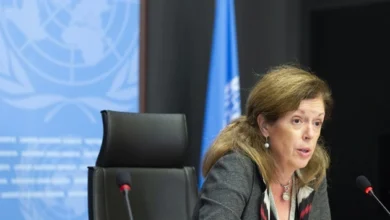5 former Libyan dignitaries detained under house arrest

Several Libyan dignitaries’ witnesses in the case of alleged Libyan financing of the presidential campaign of Nicolas Sarkozy in 2007, are no longer in prison.
According to our exclusive information, while they were held for several years in al-Hadaba prison, they are now under house arrest in Tripoli. The current fate of these top officials of the regime of Muammar Gaddafi suggests a change similar to that experienced by Saif al-Islam Gaddafi, before his release.
According to different sources, it is about five high dignitaries of the former Libyan regime: Abdallah al-Senoussi, Abu Zaid Dourda, both foreign intelligence chiefs of the old regime, Abdallah Mansour, former chief of intelligence, Al Baghdadi al-Mahmoudi, former prime minister and Saadi, third son of Colonel Gaddafi.
They have been grouped since last May in a secret place. A villa under surveillance, where their living conditions have totally changed. In al-Hadaba prison where they stayed for several years, they were tortured and deprived of walks. One of the sources assure us that today “everything is better, treatment, food, televisions…” They even have medical facilities.
However, their families and their lawyers are worried because they have no news. Neither the Attorney General of Tripoli nor the Ministry of Justice respond to their requests. They routinely complete the forms to visit the detainees, but without success. The Attorney General of Tripoli says he does not know the place of detention since the attack on al-Hadaba prison on May 26, 2017.
Authorities say they ignore the place of detention
For several months, al-Onoud, daughter of Abdallah al-Senoussi, chief of intelligence of Colonel Gaddafi, asks the Attorney General of Tripoli to see his father. The tribes of the south, from where al-Senussi originated, also ask the government for explanations without ever getting them. “The Attorney General of Tripoli informed us that he did not know where my father was being held,” al-Senoussi told the local press.
In Tripoli, no one announces it, nobody admits it, neither the general prosecutor nor the Ministry of Justice. All those responsible dodges or hide behind the silence.
In al-Hadaba Prison, which was at the same time a base of the Combatant Group, an Islamist extremist group linked to al-Qaeda, but loyal to the government, there were 174 detainees, all former officials and military of the old regime. Apart from the five top officials mentioned above, the detainees were transferred to Ain Zara B Prison, a suburb of Tripoli. Their conditions of detention have also improved. They even have access to the internet.
The al-Hadaba prison, where detainees have confessed after being tortured and sometimes raped, is now permanently closed. Several people died under torture.
Survival war between armed groups in Tripoli
Since 2011, al-Hadaba Prison was run and managed by the Combatant Group. The leader of this militia is none other than the head of the military council of Tripoli who took power following the 2011 uprising; it is about Abdel Hakim Belhaj, the man of Qatar in Tripoli, a former of Afghanistan detained under Gaddafi.
Before fleeing to Turkey in 2017, Khaled al-Sharif, the ammunition officer of this militia, ran the al-Hadaba prison where dozens of officers and officials of the former Libyan regime were transferred since late 2011, from the attack last May, 11 people were killed.
On May 26, this prison was attacked by another militia led by Haitham Tajouri. This former officer of the Libyan police has become an emir of war in Tripoli. Today he is the leader of nine armed groups united under the name of the “Tripoli revolutionaries”. Although he has no specific ideological references “he rolls on behalf of the one who pays the most,” say some observers in the Libyan capital.
Haitham al-Tajouri is responsible for several kidnapping operations, including ministers. He has attacked and occupied several ministries since 2016. Yet, he is loyal to the national unity government led by Fayez al-Sarraj. He says he is under the orders of the Ministry of Defense, but he wants to see the Misrata militia chased out of Tripoli.
Tripoli under the reign of militias and foreign influences
Haitham al-Tajouri has therefore become the most powerful emir of war in the Libyan capital. The former dignitaries of the Gaddafi regime, have never really been under the authority of the state, but pass into the hands of one militia to another. They are therefore in the hands of Haitahm al-Tajouri, further proof of the weakness of the government that submits to the rule of the militias.
What may seem even more surprising is that last April the Attorney General appointed Haitham al-Tajouri as leader of the Ain Zara prison in the suburbs of Tripoli. Curiously, it is to this prison that the detainees of al-Hadaba were transferred at the end of May.
According to several Libyan experts, the Combatant Group was sacrificed in the interest of the new dominant militia in Tripoli. For these experts, things started to change for this group (al-Moqatila in Arabic) in June 2017, during a period of crisis between Qatar and its Gulf neighbours. Doha’s interference in Libya was rejected. This country is accused of supporting and financing Islamist militias. This Gulf crisis created another reality on Libyan soil: Qatar’s allies are weakened.
According to these experts, the involvement of the Combatant Group and the Misrata militia in the Manchester bombing in England in 2017 has increased the foreign pressure on the government to limit the action of this group.
In the chaotic and volatile Libyan political landscape, each armed group defends its interest and power to the extreme. If the vice tightens around Islamist extremists, other groups take over. At a time when former regime officials are considered by some to be political prisoners, detaining him proves to be a mark of power for the militia, a winning card to play in the future. By treating with greater respect, the detained Libyan dignitaries, Haitham al-Tajouri who needs to improve his image will be more likely to get by.
The Saif al-Islam scenario repeats itself with the dignitaries of the old regime
Will these five high dignitaries of the former Libyan regime who are being transferred from prison under house arrest be released soon, as was the case with Saif al-Islam Gaddafi last year? Would the scenario of Saif al-Islam’s liberation be repeated for those former leaders, including one of the Guide’s sons?
Before being released in 2017, as revealed by RFI, Saif al-Islam Kadhafi was placed for months in a house arrest. He had then benefited from the general amnesty decreed by the Tobruk Parliament in the east of the country in 2015.
The placement under house arrest of these five Libyan dignitaries resembles in any case the case of Saif al-Islam. After all, these dignitaries will also benefit from the general amnesty, even if the issue still divides the Libyan political class.
In any case, seven years after the fall of the Libyan regime, as the country prepares for the general elections expected this year and to which Saif al-Islam has announced his candidacy, the political negotiations intensify and changes are made in any discretion. Parties are changing alliances to better redeploy themselves to the country’s political scene. Reconciliation and pacification are more than ever on the agenda.




